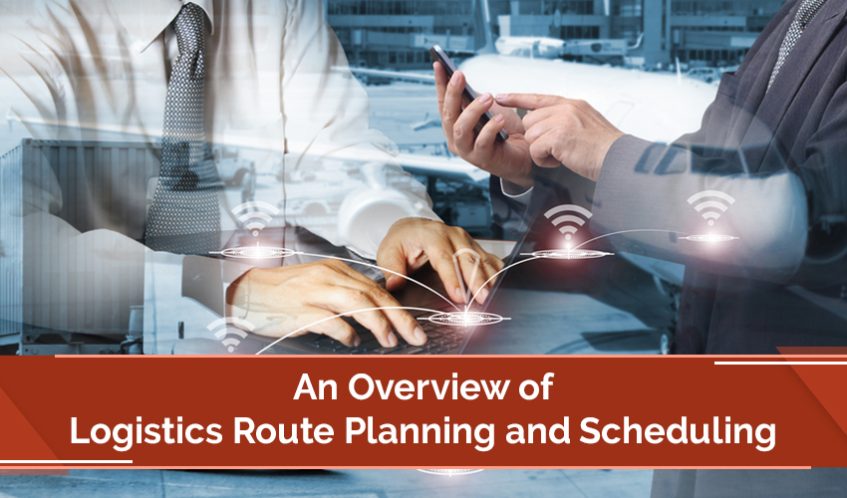-
30
Jan
An Overview of Logistics Route Planning and Scheduling
When a stage of the logistics chain isn’t completed on time, it causes production to be delayed or shipments to be lost. In order to prevent the occurrence of this type of incident, you need to schedule logistics in advance. Logistics planning and scheduling is a time-phased schedule or plan of activities for all supply chain and logistics activities. It is a significant factor in the success of a logistics business. If done properly, it can boost revenue by streamlining business functions. However, a little fault in logistics planning and scheduling could have severe repercussions on the entire chain of operations.
Scheduling logistics orders can be tedious and time-consuming, especially if the volumes are high. A good logistics schedule helps to ensure that every step of a supply chain is completed on time. Balancing properly is the key as not only it lowers cost but also reduces out-of-stock situations. Successful logistics strategies maintain a consistent plan, resulting in on-time delivery of goods, happy customers, and better logistics for last-mile deliveries.
So, how do logistic route planning and scheduling work?
The key objective of a logistics business is to deliver as many orders as possible using the shortest and most convenient route while ensuring no errors. Taking advantage of the fastest routes is crucial for running an efficient delivery operation. Logistics and supply chain businesses can take advantage of route planning and scheduling. It is possible to increase their savings by optimizing the destinations where their drivers travel. Businesses can save labor costs, fuel costs, and the drivers’ working capacity per day.
Additionally, the route plan could be affected by any unforeseen changes. Without efficient route planning, drivers may spend more time on the road leading to higher operational costs. Several parameters are taken into account when planning and optimizing logistics routes. From higher fuel costs to transportation costs and vehicular congestion to logistics distribution, it is essential to integrate advanced scheduling strategies. While it may seem easy on paper, making logistics route schedules is much more complicated in practice. There are a lot of factors to be considered for logistics route planning.
Factors to Consider for Efficient Logistics Planning and Scheduling
- Capacity: There is a limited capacity of frights to be delivered in one go. It is necessary for logistics route planners to devise an efficient way of assigning orders and drivers to vehicles based on regions.
- Locations: Planning delivery routes to cover different pickup/dropoff points, is a challenge indeed. However, the efficient execution of route planning, in reality, is entirely different. A live vehicle tracking system enables deliveries to be made on time and according to schedule.
- Time: Determine the total number of hours drivers spend on the road, including the time they have to spend at each point or midway. There can be delays in delivery due to schedule changes between involved organizations.
- Ordered activities: Logistics planning and scheduling entirely depend on the number of orders delivered, their locations, and ETA.
Benefits of Logistics Route Planning and Scheduling
- Reduces Operational Costs: An effective schedule reduces time on the road, which leads to lower fuel consumption and maintenance costs. With well-planned schedules, resources could be used just as much as required. It will lower operational costs and increase the fleet’s lifespans. Drivers tend to be less stressed about their activities if there is a schedule already in place. It will also reduce the risk of unwanted accidents on the road.
- Efficient Deliveries: As a logistics business grows, the need for an efficient delivery route increases. AI software could help to provide the best possible route according to real-time road conditions. With a well-planned schedule, companies can ensure timely deliveries using the shortest and the best way possible.
- Higher Customer Satisfaction: A faster delivery route will enhance customer satisfaction by resulting in a quicker delivery time. Delivering timely services makes a niche company competitive, attracts new customers, and strengthens customer loyalty. Faster delivery services also help to establish a good reputation among the customer base.
Logistics route planning and scheduling is a somewhat complex process. It can be challenging to increase your business’s route planning efficiency, however, it can benefit businesses in several ways. Having a third-party logistics provider help schedule and customize deliveries can make your logistics business more efficient and profitable.
In addition to optimizing scheduling, dispatch management, and data entry, Altamount also offers many other services to companies. If you want to know more about BPO logistics route planning, feel free to connect with us!
